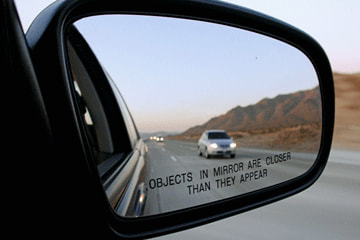|
By Jonathan Busch
On the right-hand mirror of our car is a reminder which many of us see yet rarely read. It says some version of “Objects in mirror are closer than they appear.” As for anything…every warning we encounter in our lives probably stems from something tragic happening to someone at some point. It is why there is a warning on the toaster box not to use the appliance in the bathtub! I am pretty sure there is a story and a corporate lawsuit behind that warning. There is another mirror many of us look at throughout each day which should require a warning but does not. This mirror is contained in the various social media apps we use. It does not matter if it is Facebook, Snapchat, Instagram, or 100 other varieties. The warning label on the bottom of each of these apps should read “Objects on screen may appear better than they are.” Now I am not knocking social media per say; I have partaken in my fair share of screen time. I think it is a fantastic tool to use to our advantage…just like mirrors. The inherent problem with both mirrors and social media is the blind spots we encounter. It is not healthy to us or others if we try to drive our car with just our mirrors and likewise it is not healthy for us or others if we depend on social media to help set context for our lives. When we browse through social media and view amazing posts of vacations, births, graduations, cars and pets, there is a tendency to compare. These comparisons rarely give us the benefit of the doubt. For example, we watch someone’s amazing cat video of how they have taught their feline to vacuum the house and when you look at your cat it simply sharpens its nails. It is so easy for us to look at other’s stories and rate them as positive, healthy, productive, and blessed. Then we look at our lives and we find ourselves lacking, powerless, and hopeless. Our social media posts don’t tend to present reality. Rarely do we post the authentic. For example, we post videos of our recent vacation, but rarely do we post videos of the arguments we had about where we were going to eat. We post videos of graduation celebrations but do not post videos of the fight about who is going to fill out the thank you notes. And we post videos of house, furniture, and cars but rarely review the debt we carry on these items. In other words, we tend to put our best foot forward. And for those who accidently reveal reality people respond with “TMI.” In my experience with people in the therapy office, I have observed the truth that "everyone is dealing with something…there is no free lunch.” Everyone one of us encounters pain and struggles in life, and these difficulties in life seem to be heavier than what others are going through. In the end, we all experience struggles which seem overwhelming. When we use social media to compare ourselves with others, we end up making valuations which are skewed by a glaring blind spot of reality. Scripture tells us there is only one mirror which is reliable to give us accurate feedback, it is the Bible which is the Word of God. James 1:25 says, “But if you look carefully into the perfect law that sets you free, and if you do what it says and don’t forget what you heard, then God will bless you for doing it.” The Word of God is powerful because it demands truth and authenticity. This takes place when we view ourselves in the context of what is being said in the scripture as well as what is being spoken to us through the Spirit of God. Sometimes this truth demands us to think less of ourselves (Pride of life), and sometimes this truth demands we add value to our thoughts of ourselves as His creation and children. As you are perusing social media and finding yourself amazed at other people’s posts, consider the back story behind the perfectly decorated house or impressive family photos. What are the untold stories behind the pictures? My challenge to you is to take a moment and pray for what is not posted before you lament about what is! Carry on! |
Jonathan BuschI have much to say, ArchivesCategories |

 RSS Feed
RSS Feed
